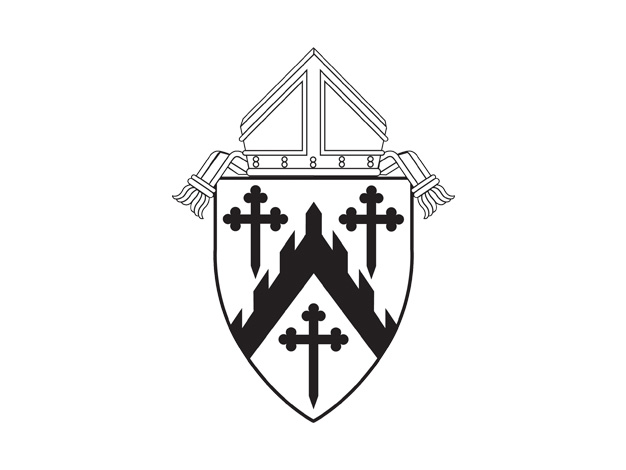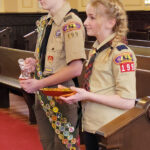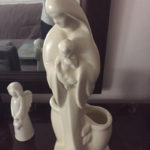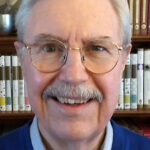
COVID-19 Protocols in the Diocese of Davenport – Moving from Step 2 to Step 3 for Reopening May 14, 2021
Note to parishioners, parents and students: Please check with your school or parish regarding their response to this change.
To Pastors and School Principals:
The following policy may be used in whole or in part starting this weekend, May 15-16, 2021. The policy is effective starting Pentecost weekend, May 22-23, 2021.
The Diocese of Davenport follows CDC guidance that increasingly distinguishes between people who are vaccinated and those not vaccinated when determining safety protocols. It is important to follow the Equal Employment Opportunity Commission (EEOC) recommendations regarding the determination of whether a staff member (employee or volunteer) has been vaccinated. Employers may ask if an individual has been vaccinated but should not ask why unless for a work-related reason.
Attendees of a meeting or event should not be asked as a group about their vaccination status because doing so reveals each person’s status to other members of the group. Certainly, if anyone wishes to disclose their vaccination status, that is their individual prerogative. Keep information you receive confidential as you would any medical-related information to comply with privacy obligations. People must be respectful of other’s privacy. Not everyone is comfortable sharing their personal information, and silence should not be interpreted as approval or disapproval of vaccines or wearing masks.
CDC Guidelines
On May 13, 2021, the CDC posted new guidelines: “When You’ve Been Fully Vaccinated”
https://www.cdc.gov/coronavirus/2019-ncov/vaccines/fully-vaccinated.html
If you are not fully vaccinated, keep taking all precautions until you are fully vaccinated including wearing a mask, maintaining six foot social distance, hand sanitizing, and using well-ventilated spaces. Please keep in mind that large group gatherings, such as Mass, do put unvaccinated individuals at higher risk. Consideration should be given to remaining at home until vaccinated.
If you’ve been fully vaccinated:
• You can resume activities that you did prior to the pandemic.
• You can resume activities without wearing a mask or staying 6 feet apart, except where required by federal, state, local, tribal, or territorial laws, rules, and regulations, including local business and workplace guidance.
• If you travel in the United States, you do not need to get tested before or after travel or self-quarantine after travel.
• If you’ve been around someone who has COVID-19, you do not need to stay away from others or get tested unless you have symptoms.
However, if you live or work in a correctional or detention facility or a homeless shelter and are around someone who has COVID-19, you should still get tested, even if you don’t have symptoms.
For now, if you’ve been fully vaccinated:
• You will still need to follow guidance at your workplace and local businesses.
• If you travel, you should still take steps to protect yourself and others. You will still be required to wear a mask on planes, buses, trains, and other forms of public transportation traveling into, within, or out of the United States, and in U.S. transportation hubs such as airports and stations. Fully vaccinated international travelers arriving in the United States are still required to get tested within 3 days of their flight (or show documentation of recovery from COVID-19 in the past 3 months) and should still get tested 3-5 days after their trip.
• You should still watch out for symptoms of COVID-19, especially if you’ve been around someone who is sick. If you have symptoms of COVID-19, you should get tested and stay home and away from others.
• People who have a condition or are taking medications that weaken the immune system, should talk to their healthcare provider to discuss their activities. They may need to keep taking all precautions to prevent COVID-19.
Diocese of Davenport Protocols
Based on these new CDC guidelines, the following protocols will be in place effective immediately in the Diocese of Davenport. Consideration should be given to people who are not vaccinated and to those who have been vaccinated but still prefer to wear a mask and keep social distance.
Cleaning, Disinfecting, and Ventilation
Follow CDC guidelines as of April 19, 2021:
https://www.cdc.gov/coronavirus/2019-ncov/community/clean-disinfect/index.html
https://www.cdc.gov/coronavirus/2019-ncov/community/ventilation.html
Meetings and Gatherings
1. In general, indoor meetings and gatherings inside and outside are not time limited. Organizers should be attentive to the amount of time gathered; the longer the time together, the greater the risk for infection unless all attendees are vaccinated. The capacity of people in a space is determined by the need for unvaccinated people to maintain six-foot distancing between them and other unvaccinated people.
2. The chancery is open to all staff while remaining closed to the public. Staff may meet with unvaccinated visitors who have appointments only in conference rooms if masked and socially distanced or in conference rooms and offices without masks and without social distancing if all attendees are vaccinated.
3. The St. Vincent Center south wing is open to vaccinated visitors.
Schools
The CDC guidelines and Diocesan protocols require the use of masks and social distancing by people who are not fully vaccinated. However, the CDC also defers to local and state guidelines. Diocesan schools should follow guidelines provided by the Iowa Department of Education and the Iowa Department of Public Health.
Faith Formation
The CDC guidelines and Diocesan protocols require the use of masks and social distancing by people who are not fully vaccinated.
Travel
Follow CDC guidelines as of April 17, 2021:
Domestic Travel: https://www.cdc.gov/coronavirus/2019-ncov/travelers/travel-during-covid19.html
International Travel: https://www.cdc.gov/coronavirus/2019-ncov/travelers/testing-air-travel.html
Liturgy (in general)
1. Masks and social distancing are not required by anyone who is vaccinated. Masks and social distancing are required by anyone who is not vaccinated. Six-foot distancing from unvaccinated households is required.
2. In general, incense should be avoided. In rites where incense is explicitly called for (funeral rites, exposition), incense should be used.
3. Missalettes and hymnals may be used. People are encouraged to use hand sanitizer after handling common objects. Bulletins may be distributed.
4. Fonts may be used. Fonts/stoups with standing water should not be used unless the water is changed daily. Fonts with plumbing should be cleaned and sanitized before first use according to CDC guidelines: https://www.cdc.gov/coronavirus/2019ncov/community/officebuildings.html and https://www.cdc.gov/coronavirus/2019-ncov/php/building-water-system.html.
5. Music ministry (cantor, choir, all instruments) is permitted if the ministers have been vaccinated. Congregational singing is permitted. Members of the assembly who have not yet been vaccinated must wear masks while singing or choose to remain silent. The number of verses sung should be limited to completing the current action. For example, the duration of the processions, preparation of the gifts, and the distribution of Holy Communion.
6. Procession through the assembly may resume with the members of the procession unmasked if vaccinated. Those who are unvaccinated must wear masks and socially distance.
7. The use of multiple readers is permitted. The use of servers is permitted. If not vaccinated, ministers are to be masked (except readers may remove their mask when at the ambo if desired).
8. The longer a group is together, the greater the chance of transmission. Liturgies should be kept to a reasonable length and not unduly prolonged.
Specific Liturgies
Celebration of the Eucharist
1. Separate chalices may be prepared for the priest and deacon (and any concelebrants). Each cleric will purify the chalice he used.
2. Vessels for the hosts should be filled ahead of time, if possible, to avoid having to handle the hosts at the fraction. A single large host should be used by the priest alone.
3. The collection as usual may resume. Baskets with long handles are preferred for the collection. People are encouraged to use hand sanitizer after handling common objects. The procession with the gifts may take place using vaccinated parishioners.
4. The Sign of Peace may be exchanged as customary within households. Otherwise, a bow is preferred.
5. Hands are not held for the Lord’s Prayer (except as a household if customary).
6. Communion is distributed only under the form of the Host. Communion on the tongue is permitted to those who have been vaccinated. Those who are unvaccinated and wish to receive on the tongue should present themselves at the end of communion line.
Exposition and Adoration
1. Adoration chapels are open. Consideration should be given, especially by those who are unvaccinated, to adequate ventilation and the size of the space to accommodate the people assembled.
Baptism of Children
1. Baptism of more than one child may take place at the same time if the adults are vaccinated.
2. The anointings may take place as usual. An instrument is not required.
3. Rather than using water directly from the font, water should be blessed in a separate pitcher and then poured over the head of the
infant.
Confirmation
1. Outside of initiating adults, the Bishop will celebrate Confirmation in parishes. Confirmation takes place during Mass.
2. If vaccinated, the sponsor may stand with the candidate, placing their right hand on the right shoulder of the one being confirmed.
3. If there are unvaccinated candidates, the anointing may be done with a cotton ball or Q-Tip.
4. The sign of peace is exchanged verbally (hands are not shaken)
Weddings
1. Weddings may be celebrated, with or without Mass, following the guidance above.
Reconciliation
1. The preferred place for confession is in the church. An open space that allows for both privacy and the circulation of air should be chosen. An impermeable screen should be provided unless the penitent and the priest are vaccinated.
2. The use of a confessional, due to lack of ventilation, is not recommended. If both the penitent and priest are vaccinated, the use of a chapel of reconciliation with adequate ventilation is permitted.
3. Form II may be celebrated, following the general liturgical norms above. Consider offering an extended period for private confession (Form I) if an extended period of time is needed. Form III is not permitted.
Pastoral Care of the Sick and Dying
1. Ministers bringing Holy Communion to the sick or homebound must be vaccinated.
2. If everyone involved in a visit is vaccinated, masks need not be worn. In making visits to those who have not been vaccinated, masks, six-foot social distancing, and hand sanitizing must be followed. The duration of the visit should be kept short.
3. If visiting a hospital, nursing home, or other institutions, their protocols are to be followed.
4. Masses or Liturgies of the Word with Communion (“communion services”) may be celebrated in institutions, following all applicable protocols.
5. Vaccinated priests may visit COVID-19 patients following diocesan protocols for such visits and the protocols of the visited location. If a priest is not vaccinated, he should ask another priest to make the visit instead. In case of necessity, the pastor may ask a vaccinated deacon or lay minister to bring communion to someone in need. They are to follow the same protocols.
Communal Anointing of the Sick
1. May be celebrated outside of Mass, following the relevant protocols above.
2. May be celebrated within Mass, keeping to the time limits and other precautions listed above.
3. A single-use instrument (such as a cotton swab) is used for the anointing.
4. Laying on of hands is done over the person rather than by touch.
Funeral Rites
1. The funeral rites, including the funeral Mass, may be celebrated following the guidance above.
2. At the funeral liturgy, the placing of the pall and Christian symbols may take place.
3. At the committal, the sign or gesture of leave-taking may not include kissing a common object, such as the coffin.
We are hopeful that soon we will be able to further reduce the restrictions for in-person sessions, meetings, gatherings, and faith formation activities. Since the nature of the pandemic may shift, parishes should be ready to conduct sessions virtually if necessary.
The dispensation from participating in Mass continues to be in effect until a date to be determined.
All other protocols remain in place











